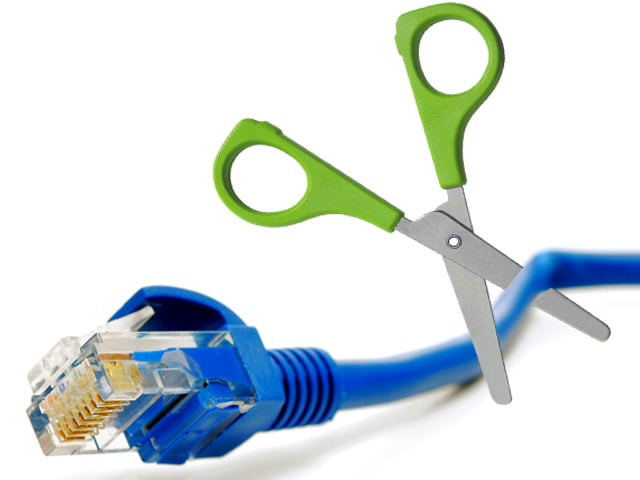Internet censorship: Activists worry as authorities push for automated filtering
National URL Filtering and Blocking System will allow en masse blocking of ‘offensive’ websites.

After broadband operators’ vocal support for the implementation of an automated URL filtering system, proponents of internet freedom have started worrying that the government will go ahead with its censorship plans. They say that if the government fails to ensure transparency and accountability in the system’s working, it will be the last nail in the coffin of internet freedom.
The Internet Service Providers Association (Ispak), in an email, has confirmed its support for the National URL Filtering and Blocking System – this will enable the en masse blocking of websites that contain ‘blasphemous’ and ‘pornographic’ content, as well as those that ‘pose a threat’ to ‘national security’. The system is to be implemented at the internet gateways of PTCL and TWA – the two submarine cables connecting Pakistan with the global internet.
Internet service providers back the proposed automation of the current manual censorship process, and argue that it poses no threat to internet freedom. “There is nothing wrong with the concept and the system wouldn’t compromise the performance of the Internet,” Ispak Convener Wahajus Siraj tells The Express Tribune.
“The practice of manual URL blocking is already in place,” Siraj explains. “If the government wants to block a website posing a threat to national security, it doesn’t need the automated system,” he adds. “Opposing the idea of an automated system, therefore, doesn’t make sense.”
Siraj says that the selection of controversial websites is a policy issue, and has nothing to do with automation of the current system; which is an operational matter.
Internet activists, on the other hand, have an entirely different view of the proposed system; they sometimes refer to it as Pakistan’s equivalent of the Great Fire Wall of China.
“The term ‘automation’ is misleading because it gives the impression that it is [merely] automating a process that’s already happening. This takes away the severity of the issue,” says Sana Saleem – a blogger at The Guardian, Global Voices and Dawn.
Saleem – who is leading a campaign against internet censorship for human rights organisation Bolobhi – says there is no legislation governing internet censorship, while the government has also not been able to assure transparency and accountability in the working of the proposed system.
“This isn’t about simple automation of pre-existing censorship – which would be wrong nonetheless – but about acquiring a flip-flop switch for broader censorship,” Saleem says. “Under the current system, they can’t access users’ personal data at the https level – but the automated system will allow them to do so,” she adds. “They can block any website without reason. Several Baloch websites have already been blocked.”
“We do not expect the government to ignore hate speech or cyber-crime, but a committee comprising all stakeholders needs to define these terms clearly and a policy document needs to be devised,” she opines. “The constitution prohibits distribution of such content, but the internet is not the distributor,” she points out; “people access it voluntarily.”
An Inter-Ministerial Committee presently decides which websites should be blocked. Its board is comprised of bureaucrats, and there is no representation from the private sector, civil society or even parliament. Saleem believes this must change. “A legislation that is friendly and approved by all should make its way to the parliament in the true spirit of democracy,” she says.
The Pakistan Telecommunication Authority, however, has hinted that it will adopt the program at any cost.
“A cost effective, automated and transparent system for blocking of blasphemous and objectionable contents is fully supported by PTA,” PTA Chairman Muhammad Yaseen said in a statement, while responding to queries from The Express Tribune. “The current process of blocking, being manual and tedious, is difficult to implement and has its limitations,” he added.
According to Yaseen, the publication and promotion of ‘blasphemous’, ‘un-Islamic’, ‘offensive’, ‘objectionable’, ‘unethical’ and ‘immoral’ material ‘discomforts’ the majority of the population of Islamic Republic of Pakistan, and “the government needs to address their concerns.”
“There is no denying the advantages of the internet, but the same should not be at the cost of religious norms,” he stated.
Point out a potential flaw in such reasoning, Saleem says that ‘objectionable’, ‘obscene’ and even ‘national security’ are poorly defined terms that may act as ploys for broader surveillance and censorship.
So far, the government has remained silent in response to Saleem’s queries asking who was taken on board before the proposal was formulated for the automated censorship system. Internet activists are despairing because of a lack of transparency and worry that the proposal will be pushed without addressing their concerns.
“We know that they might just go ahead with it,” says Saleem.
Published in The Express Tribune, April 18th, 2012.



















COMMENTS
Comments are moderated and generally will be posted if they are on-topic and not abusive.
For more information, please see our Comments FAQ